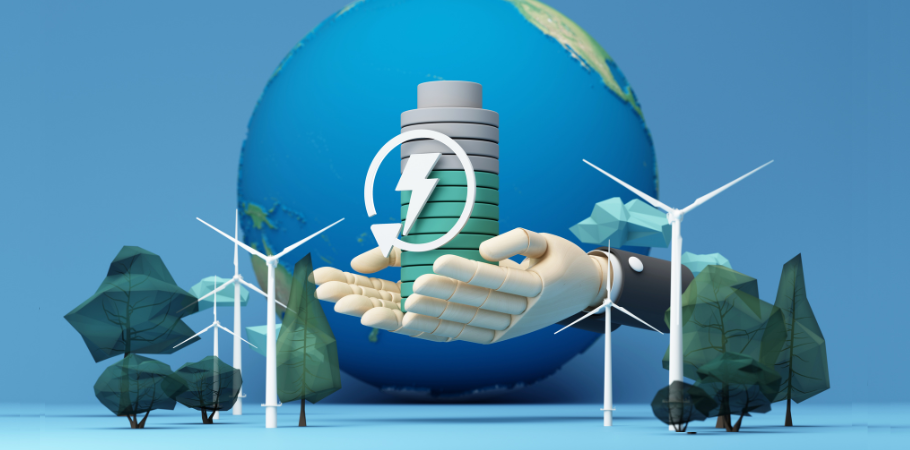
In recent years, environmental problems such as global warming and energy depletion have become more serious, and the importance of renewable energy has become more and more widespread. In this article, we will discuss the types of renewable energy, the benefits of renewable energy, and the challenges for companies to adopt renewable energy.
What is Renewable Energy?
Renewable energy is a new form of energy that can generate electricity using the power of nature. Unlike finite resources like fossil fuels, renewable energy has a persistent presence on the planet. Therefore, it is an important factor in ensuring the stability of the long-term energy supply. The following are three characteristics of renewable energy:
1. Renewability
Renewable energy, as the name suggests, has the ability to regenerate. Sunlight is always shining, winds are blowing, water is flowing, and geothermal heat is inside the earth. These are inexhaustible on the planet. So, if the right technology and infrastructure are in place, we can use this energy without fear of shortages.
2. Reduction of Environmental Impact
The benefits of renewable energy usage is it can reduce CO2 emissions and other pollutants associated with fossil fuels. This has the effect of reducing the burden on the environment, such as mitigating global warming and reducing air pollution.
3. Energy Security
The use of renewable energy is useful in securing a domestic source of energy that does not depend on imports. International political conditions can affect fossil fuels such as oil and gas. However, renewable energy contributes to a stable supply of energy because it depends on local weather and geographical conditions.
Obviously, renewable energy is an important element at the core of sustainable energy policy. It is actively adopted to protect the environment and ensure a stable supply of energy. However, there are some challenges to adoption. This challenge will be discussed below.
Types of Renewable Energy
Renewable energy comes in a variety of forms. The following is a description of the main types of renewable energy:
- Solar power: Photovoltaic power generation uses sunlight to generate energy. Specifically, by exposing sunlight to a device called a “solar cell,” it creates a flow of electricity and obtains electricity from the flow of electricity.
- Wind power: Wind power uses the wind to generate energy. When the wind turns the windmill, it generates energy, and when transmitting the generated energy to the generator inside, it generates electricity.
- Geothermal power: Geothermal power generation is a method of generating electricity using geothermal, or magma. The heat of the magma evaporates rainwater that has accumulated underground and turns it into steam. Then, this steam turns a turbine and generates electricity.
- Hydropower: Hydropower can literally use water to generate electricity. The flowing water from a high position to a low-lying generator will generate electricity.
- Biomass power: Biomass power generation is a power generation method that uses waste, animals and plants as raw materials. It is made from livestock manure, unused wood, rice straw, corn, sugar cane, rapeseed, etc. By burning these, they turn the turbine and generate energy.

Benefits of Renewable Energy for Companies
Below, we’ll take a closer look at the four benefits of renewable energy that companies can benefit from adopting renewables.
1. Contribution to the environment
The use of renewable energy reduces emissions of carbon dioxide and other greenhouse gases compared to fossil fuels. Thereby it helps reduce the environmental impact of companies. Positive contributions to the environment are a factor that reinforces corporate social responsibility and increases the trust of customers and stakeholders.
2. Image Enhancement
The introduction of renewables is an important symbol of a company’s commitment to sustainability. Environmentally friendly management is emphasized as part of corporate social responsibility (CSR), and actively publicizing environmental initiatives contributes to improving the company’s image. This will help us gain the support of ethical consumers and socially conscious investors.
3. Stabilization of energy costs
Since renewable energy is based on unlimited resources, it has a stable price regardless of rising raw material costs or fluctuations in energy prices. In the long run, renewables are advantageous for stabilizing energy costs and keeping a company’s bottom line stable. This will allow businesses to remain competitive and reap economic benefits.
4. Government Support and Incentives
Many countries offer government support measures and incentives to promote the adoption of renewable energy. Policies such as tax incentives, subsidies, and green certification schemes reduce the cost of introducing renewables. In addition, since the introduction of renewable energy contributes to the compliance of companies with environmental regulations, government policy measures will be beneficial to companies.
Taken together, these benefits make it a beneficial strategy for companies to adopt renewable energy. This helps them develop environmentally friendly operations and increase social trust. Moreover, they can ensure a stable supply of energy and pursue economic benefits.
Besides Benefits of Renewable Energy, There are Still Challenges
Now, let’s take a closer look at the four challenges companies face when implementing renewables.
1. Initial Investment Costs
Renewable energy requires an initial investment to install equipment such as solar panels and wind turbines. In fact, these facilities are expensive and can be a burden, especially for small businesses and startups. Therefore, it is necessary to raise funds and develop an investment plan. However, from a long-term perspective, you may be able to expect a return on your initial investment if you take into account incentives such as stabilizing energy costs and tax incentives from the introduction of renewable energy.
2. Instability of Power Generation
Renewable energy has the characteristic that the amount of power generated fluctuates due to fluctuations in sunlight and wind. In particular, solar and wind power generation may face challenges in ensuring a stable supply of energy. It is because of the difficulty to guarantee a certain amount of power generation. To address this problem, it is necessary to introduce energy storage technologies and improve the accuracy of forecasting systems.
3. The Need for Space
Renewable energy installations require space and space such as solar panels and wind turbines. In particular, solar power generation requires a large area. And it may be difficult to introduce it in limited spaces such as urban areas. This can lead to challenges related to securing land and installing it in buildings. On the other hand, there are ways to overcome space challenges by making effective use of rooftops and unused land.

These are key challenges that companies face in the deployment of renewable energy. However, if they can be overcome, they will have the potential to contribute to the environment and reap economic benefits at the same time.
Summary
Actively adopting renewable energy is an important step toward sustainable corporate growth and social contribution. Companies can gain many benefits of renewable energy by taking clear measures to address the challenges. Moreover, it is important for companies to address these challenges from a strategic perspective and steadily promote renewable energy.
See more: An Important TCFD Element: Find out the Risk Management


